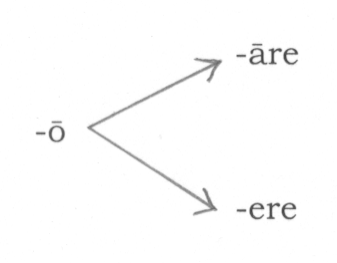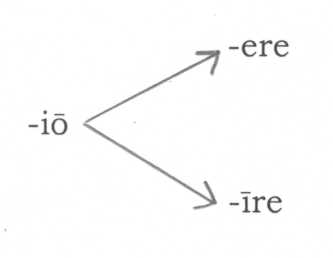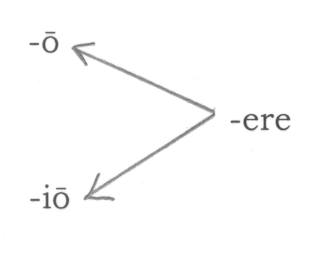Introduction
Principal parts of verbs are used to give the stems needed to form all the different tenses, voices, and moods of verbs (in various persons and numbers). The forms are:
-ō: first person singular present active indicative (-or deponent): “I ________”
-re: present active infinitive (deponent: -(r)ī): “to ______”
-ī: first person singular perfect active indicative: “I ____ed”
-tus/-sus (/-tum/-sum) perfect passive participle: “(having been) ___ed”
Tense indicates both time and aspect. The stem expresses the aspect, that is the kind of action. The stem from the first two principal parts expresses the aspect of unfinished action, and is thus used for the present (e.g. scrībō I am writing), future (scrībam I will write), and imperfect (scrībēbam I was writing).
Two forms are needed for this in order to distinguish on the one hand between first and third conjugation (which both have -ō for the first principal part):

and third -iō and fourth conjugation (which both have -iō for the first principal part):

and on the other hand between third and third -iō (which both have -ere for the second principal part):

The stems from the third and fourth principal parts express completed action, and are thus used for the perfect (scrīpsī I wrote), pluperfect (scrīpseram I had written), and future perfect (scrīpserō I will have written). The third principal part gives the stem for active forms and the fourth principal part for passive forms.
Regular principal parts:
-ā stem (1st conjugation): -ō, -āre,-āvī, -ātus (-a, -um)
amō, amāre, amāvī, amātus (-a, -um)
(deponent) arbitror, arbitrārī, arbitrātus (-a, -um) sum (Group 10)
-ē stem (2nd conjugation): -eō, -ēre, -uī, -itus (-a, -um)
habeō, habēre, habuī, habitus (-a, -um)
(3rd conjugation): -ō, -ere, -ī, -tus (-a, -um)
-ī (no one way for perfect active stem; all end in -ī),
-tus/-sus (-a, -um) (regular: no vowel before -t/-s)
regō, regere, rexī, rēctus (-a, -um)
[3rd -iō: -iō, -ere, -ī, -tus (-a, -um)
-ī (no one way; all end in -ī);
-tus/-sus (regular: no vowel before -t/s)
capiō, capere, cēpī, captus (-a, -um)
-ī stem (4th conjugation): -iō,-īre, -īvī, -ītus (-a, -um)
audiō, audīre, audīvī, audītus (-a, -um)
Types of Perfect Active Stems
There are five basic types (plus two other) of perfect active stems in Latin (in approximate order of frequency):
- -u/-v stems
- stems in -s
- stems characterized by a long vowel
- stems with a pattern of vowel change
- reduplicated stems
- stems showing no change
- perfects from a different stem
Note that some of these changes are in the middle of the root. The perfect also uses its own set of personal endings, which help you distinguish (present) vid-ēs from (perfect) vīd-istī.
I. -u/v stems:
Regular 1st and 4th conjugation verbs: stem vowel + v (-āvī/-īvī)
amō, amāre, amāvī, amātus (-a, -um)(Group 1)
audiō, audīre, audīvī, audītus (-a, -um)
Regular 2nd conjugation: (no stem vowel) -u (-uī)
habeō, habēre, habuī, habitus (-a, -um)(Group 1)
teneō, tenēre, tenuī, tentum (Group 2)
contineō, continēre, continuī, contentum (Group 15)
retineō, retinēre, retinuī, retentum (Group 8)
sustineō, sustinēre. sustinuī, sustentum (Group 15)
Other: A few third conjugation (and irregular) verbs have perfective active stems in -v/-u.
Miscellaneous -u-
alō, alere, aluī, al(i)tus (Group 16)
aperiō, aperīre, aperuī, apertus (Group 15)
colo, colere, coluī, cultus (Group 8)
consulō, consulere, consuluī, consultus (Group 13)
deserō, desere, deseruī, desertus (Group 11)
gignō, gignere, genuī, genitus (Group 8)
possum, posse, potuī (Group 1)
rapiō, rapere, rapuī, raptus (Group 13)
ēripiō, ēripere, ēripuī, ēreptus (Group 13)
volo, velle, voluī, volitūrus (Group 2)
mālō, malle, maluī (Group 9)
nōlō, nōlle, nōluī (Group 7)
pōnō (< posnō < po-sino), pōnere, posuī, positus (Group 4)
compōnō, compōnere, composuī, compositus (Group 11)
impōnō, impōnere, imposuī, impositus (Groups 9 and 11)
prōpōnō, prōpōnere, prōposuī, prōpositus (Group 14)
Miscellaneous -v-
cernō, cernere, crēvī, crētus (Group 11)
compleō, complēre, complēvī, complētus (-a, -um)(Group 11)
cupiō, cupere, cupīvī, cupītus (Group 13)
fleō, flēre, flēvī, flētus (-a, -um) (Group 9)
impleō, implēre, implēvī, implētus (-a, -um)(Group 9)
petō, petere, petīvī or petiī, petītus (Group 6)
repetō, repetere, repetīvī, repetītus (Group 8)
quaerō, quaerere, quaesīvī, quaesītum (Group 4)
solvō, solvere, solvī (/soluī), solūtus (-a, -um) (Group 8)
sapiō, sapere, sapīvī, (Group 13)
sternō, sternere, strāvī, strātus (Group 16)
eō, īre, īvī (/iī), itūrus (Group 4)
abeō, abīre, abiī, abitūrus (Group 16)
adeō, adīre, adiī (/adivī), aditus (Group 11)
exeō, exīre, exiī (Group 13)
ineō, inīre, iniī (inivī), inītus (Group 7)
pereō, perīre, periī (/perivī), peritus (Group 7)
praetereō, praeterīre, praeteriī, praeteritus (Group 16)
redeō, redīre, rediī, reditūrus (Group 4)
subeō, subīre, subiī (/subivī), subitus (Group 16)
transeō, transīre, transiī, transitus (Group 16)
Verbs in -scō-
Note: Verbs with a –scō suffix in the present (imperfective) system, regularly have a perfect active in –v (without the -sc-)(For the -scō suffix, see Word Formation, verb suffixes.):
consuescō, consuescere, consuēvī, consuētus (Group 10)
crescō, crescere, crēvī, crētus (Group 10)
nōscō, nōscere, nōvī, nōtus (Group 5)
cōgnōscō, cognōscere, cōgnōvī, cōgnitus (Group 5)
agnoscō, agnoscere, agnōvī, agnitus (Group 10)
quiēscō, quiēscere, quiēvī, quiētus (Group 10)
II. Perfect active stems in -s
Sub-Group A:present stems in -d or -t
Note: the -d or -t drops before -s (with compensatory lengthening of the vowel before) or assimilates to -s. Note that these verbs also have a fourth principal part in -sus (instead of -tus); videō, sedeō, and cadō follow this pattern in the perfect passive, but not the perfect active. A few others also have -sus (see maneō, sub-group C below). (See also Linguistic Rules)
Hint: So, if you have a perfect form in -s, try going back to a present stem in -t or -d.
ardeō, ardēre, arsī (Group 9)
claudō, claudere, clausī, clausus (Group 14)
dīvidō, dīvidere, dīvīsī, dīvīsus (Group 14)
ēvādō, ēvādere, ēvāsī, ēvāsus (Group 13)
lūdō, lūdere, lūsī, lūsus (Group 16)
mittō, mittere, mīsī, missus (Group 1)
āmittō, āmittere, āmīsī, āmissus (Group 16)
committō, committere, commīsī, commissus (Group 14)
dīmittō, dīmittere, dīmīsī, dīmissus (Group 8)
permittō, permittere, permīsī, permissus (Group 11)
prōmittō, prōmittere, prōmīsī, prōmissus (Group 14)
remittō, remittere, remīsī, remissus (Group 8)
persuadeō, persuādere, persuāsī
rīdeō, rīdēre, rīsī, rīsus (-a, -um)(Group 9)
sentiō, sentīre, sēnsī, sēnsus (Group 7)
-Double s-
cēdō, cēdere, cessī, cessus (-a, -um) (Group 8)
accēdō, accēdere, accessī, accessus (Group 8)
concēdō, concēdere, concessī, concessus (Group 8)
dis-cēdō, dis-cēdere, dis-cessī, dis-cessus (Group 8)
procēdō, procēdere, processī, processus (Group 8)
iubeō, iubēre, iussī, iussus (-a, -um)(original stem *dh, which becomes “b” in Latin)(Group 5)
Sub-Group B: Present stems in -c or -g (+ -s > -x)
(see Linguistic Rules).
Hint: For perfects in -x, try a present stem in -c or g.
augeō, augēre, auxī, auctus (Group 15)
cingō, cingere, cinxī, cinctus (Group 16)
dīcō, dīcere, dīxī, dictus (Group 3)
dīligō, dīligere, dīlēxī, dīlēctus (Group 6)
dūcō, dūcere, dūxī, ductus (Group 4)
addūcō, addūcere, addūxī, adductus (Group 11)
dēdūcō, dēdūcere, dēdūxī, dēductus (Group 14)
ēdūcō, ēdūcere, ēdūxī, ēductus (Group 13)
redūcō, redūcere, redūxī, redūctus (Group 8)
fīgō, fīgere, fīxī, fixus (Group 16)
fingō, fingere, finxī, fīctus (Group 14)
flectō, flectere, flēxī, flexus (Group 16)
fluō, fluere, fluxī, fluxum (Group 11)
īnstruō, īnstruere, īnstrūxī, īnstrūctus (Group 16)
iungō, iungere, iūnxī, iūnctus (Group 11)
[legō, legere]
intellegō, intellegere, intellexi, intellectus (Group 8)
neglegō, neglegere, neglexī, neglectus (Group 14)
regō, regere, rēxī, rēctus (Group 3)
surgō (< surr-igo < sub-regō), surgere, surrēxī (Group 8)
spargō, spargere, sparsī, sparsus (Group 14)
[speciō, specere, spēxī, spectus]
[spectō, spectāre, spectāvī, spectātus – frequentative]
aspiciō, aspicere, aspēxī, aspectus (Group 13)
conspiciō, conspicere, conspēxī, conspectus (Group 13)
respiciō, respicere, respēxī, respectus (Group 13)
tegō, tegere, tēxī, tēctus (Group 6)
torqueō, torquēre, torsī, tortus (-a, -um) (Group 15)
trahō (trag-), trahere, traxī, tractus (Group 8)
vehō, vehere, vēxī, vēctus (Group 14)
vīvō, vivere, vīxī, vīctūrus (Group 1)
Sub-Group C: miscellaneous others
contemnō, contemnere, contempsī, contemptus (Group 16) (for the added labial consonant (p/b), compare Spanish)
gerō (< ges-ō, see Linguistic Rules #2), gerere, gessī, gestus (Group 6)
haereō, haerēre, haesī, haesūrus (-a, -um)(Group 15)
maneō, manēre, mānsī, mānsūrus (Group 9)
remaneō, remanēre, remānsī, remānsūrus (Group 9)
premō, premere, pressī, pressus (Group 8)
opprimō, opprimere, oppressī, oppressus (Group 8)
scrībō, scrībere, scrīpsī, scrīptus (Group 5)
sumō, sumere, sūmpsī, sūmptus (Group 11)
III. Perfect active stems characterized by a long vowel:
Sub-Group A: Contracted -u/v-
These have stems in -v; they are contractions of the regular -v/-u type.
caveō, cavere, cāvī, cautus (-a, -um) (Group 15)
iuvō, iuvāre, iūvī (< iuvāvī), iūtus (Group 7)
moveō, movēre, mōvī (for movuī), mōtus (Group 2)
removeō, removēre, remōvī, remōtus (Group 15)
voveō, vovēre, vōvī, vōtus (Group 15)
Sub-Group B:Lengthened Stem Vowel
edō, edere/esse, ēdī, ēsus (Group 16)
fugiō, fugere, fūgī, fugitūrus (Group 2)
legō, legere, lēgī, lēctus (Group 4)
colligō, colligere, collēgī, collēctus (Group 11)
dēligō, dēlegere, dēlēgī, dēlēctus (Group 16)
ēligō, ēligere, ēlēgī, ēlēctus (Group 13)
sedeō, sedēre, sēdī, sessum (Group 9)
veniō, venīre, vēnī, ventūrus (Group 2)
conveniō, convenīre, convēnī, conventus (Group 11)
inveniō, invenīre, invēnī, inventus (Group 3)
perveniō, pervenīre, pervēnī, perventus (Group 15)
videō, vidēre, vīdī, vīsus (Group 1)
invideō, invidēre, invīdī, invīsus (Group 9)
Note: Those verbs with a nasal infix in the present stem drop the -n and lengthen the stem vowel.
fundō, fundere, fūdī, fūsus (Group 13)
effundō, effundere, effūdī, effūsus (Group 13)
linquō, linquere, līquī, lictus (Group 14)
relinquō, relinquere, relīquī, relictus (Group 3)
rumpō, rumpere, rūpī, ruptus (Group 14)
vincō, vincere, vīcī, victus (Group 4)
IV: Pattern of vowel change
| Present (imperfective stem) | Perfect Active (perfective active stem) |
Perfect passive (perfective passive stem) |
|
| Regular verb | -a- | -ē- | -a- |
| Compound verb(vowel weakening) | -i- | -ē- | -e- |
Compare English types such as “sing, sang, sung.”
Note: Note that most of these are third and third -io conjugation.
agō, agere, ēgī, āctus (Group 4)
cōgō, cōgere, coēgī, coāctus (Group 11)
capiō, capere, cēpī, captum (Group 1)
accipiō, accipere, accēpī, acceptum (Group 2)
excipiō, excipere, excēpī, exceptum (Group 13)
incipiō, incipere, incēpī, inceptum (Group 13)
praecipiō, praecipere, praecēpī, praeceptum (Group 12)
recipiō, recipere, recēpī, receptum (Group 4)
suscipiō, suscipere, suscēpī, susceptum (Group 13; 15; 16)
faciō, facere, fēcī, factum (Group 2)
conficiō, conficere, confēcī, confectum (Group 11)
dēficiō, dēficere, dēfēcī, dēfectum (Group 13)
efficiō, efficere, effēcī, effectum (Group 13)
interficiō, interficere, interfēcī, interfectum (Group 13)
perficiō, perficere, perfēcī, perfectum (Group 15)
praeficiō, praeficere, praefēcī, praefectum (Group 12)
frangō, frangere, frēgī, frāctus (Group 11)
iaciō, iacere, iēcī, iactus (Group 16)
cōniciō, cōnicere, cōniēcī, coniectum (Group 16)
V: Reduplicated perfect.
The initial consonant is repeated at the beginning with a vowel, usually -e-, added between the doubled consonant and the original.
Note that this reduplication, by lengthening the word and moving the accent forward, often leads to vowel weakening of the stem vowel; see Linguistic Rules.
cadō, cadere, cecidī, cāsūrus (Group 11)
canō, canere, cecinī, cantus (Group 6)
discō, dīscere, didicī (Group 11)
dō, dare, dedī, datus (Group 1)
addō, addere, addidī, additus (Group 14)
condō, condere, condidī, conditus (Group 14)
crēdō, crēdere, crēdidī, crēditus (Group 4)
perdō, perdere, perdidī, perditus (Group 11)
prōdō, prodere, prodidī, proditus (Group 16)
reddō, reddere, reddidī, redditus (Group 8)
trādō, trādere, trādidī, traditus (Group 16)
fallō, fallere, fefellī, falsus (Group 8)
parcō, parcere, pepercī, parsūrus (Group 14)
pariō, parere, peperī, partus (Group 13)
pellō, pellere, pepulī, pulsus (Group 14)
impellō, impellere, impulī, impulsus (Group 14)
pendō, pendere, pependī, pēnsus (Group 16)
reperiō, reperīre, repperī, repertus (Group 15)
stō, stāre, stetī, status (Group 5)
constō, constāre, constitī, constātūrus (Group 12) (for the vowel weakening: -stet- > -stit, see linguistic rules)
resistō, resistere, restitī (Group 16)
tangō, tangere, tetīgī, tāctus (Group 9)
contingō, contingere, contigī, contāctus (Group 14)
tendō, tendere, tetendī, tentus (Group 13)
Sub-Group A: verbs with -u- or -o- root vowel
If the root vowel is -u- or -o-, that is reduplicated (instead of using -e-).
currō, currere, cucurrī, cursūrus (Group 11)
poscō, poscere, poposcī (Group 16)
VI: Perfect actives with no change:
bibō, bibere, bibī, bibitus (Group 8)
occīdō, occīdere, occīdī, occīsus (< caedō) (Group 14)
induō, induere, induī, indūtus (Grouop 16)
metuō, metuere, metuī, (Group 11)
ruō, ruere, ruī, (ruitūrus) (Group 16)
solvō, solvere, solvī (/soluī), solūtus (-a, -um) (Group 8)
statuō, statuere, statuī, statūtus (Group 8)
cōnstituō, cōnstituere, cōnstituī, cōnstitūtus (Group 8)
instituō, instituere, instituī, institūtus (Group 14)
vertō, vertere, vertī, versus (Group 8)
āvertō, āvertere, āvertī, āversus (Group 16)
convertō, convertere, convertī, conversus (Group 16)
revertō, revertere, revertī, reversus (Group 8)
volvō, volvere, volvī, volūtus (Group 14)
Note Verbs with stems in -nd- regularly follow this pattern:
defendō, defendere, defendī, defensus (Group 11)
incendō, incendere, incendī, incensus (Group 16)
pandō, pandere, pandī, pansus/passus (Group 14)
respondeō, respondēre, respondī, responsus (Group 1)
[scandō, scandere]
ascendō, ascendere, ascendī, ascēnsus (Group 14)
dēscendō, descendere, dēscendī, dēscēnsus (Group 14)
tendō, tendere, tendī, tentus
contendō, contendere, contendī, contentus (Group 16)
intendō, intendere, intendī, intentus/intensus (Group 9)
ostendō, ostendere, ostendī, ostentus (Group 13)
Ones that reduplicate as a simple verb:
accidō, accidere, accidī ( < cadō)(Group 11)
VII. Perfects using a different stem: (certain irregular verbs)
ferō, ferre, tulī, lātus (Group 3)
adferō (/afferō), afferre, attulī, allātus (Group 11)
auferō, auferre, abstulī, ablātus (Group 16)
conferō, conferre, contulī, conlātus (Group 11)
deferō, deferre, detulī, delātus (Group 14)
efferō, efferre, extulī, ēlātus (Group 13)
inferō, inferre, intulī, illātus (Group 9)
offerō, offerre, obtulī, oblātus (Group 15)
perferō, perferre, pertulī, pellātus (Group 15)
referō, referre, retulī, relātus (Group 3)
sum, esse, fuī, futūrus (Group 1)
adsum, adesse, adfuī, adfutūrus (Group 2)
supersum, superesse, superfuī, superfutūrus (Group 7)
tollō, tollere, sustulī, sublātus (Group 8)